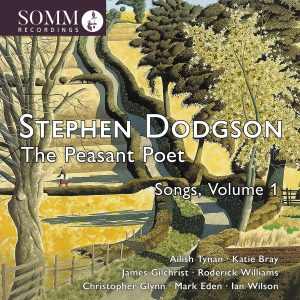STEPHEN DODGSON Four poems of John Clare. Mrs Hen. Heaven-haven. Five eyes. The monk and his cat. Bush ballads. Eight fanciful pieces: A leaf in the river; Shrovetide procession. Irishry. Tideways. Inversnaid. Slow slow fresh fount • Ailish Tynan (sop); Katie Bray (mez); James Gilchrist (ten); Roderick Williams (bar); Mark Eden (gtr); Ian Wilson (rcr); Christopher Glynn (pn) • SOMM 0659 (64:02 )
—
Somm has brought us a composer new to this reviewer, if not quite new to these pages. Stephen Dodgson is being celebrated, as it is just 10 years since his death in 2013 at the grand old age of 89.
Dodgson was born in 1924 and was a distant cousin of Lewis Carroll. After World War II, he studied composition at the Royal College of Music. He returned there later as a professor of composition until his retirement in 1982. He became best known for his guitar concerti, which were played initially by John Williams. Dodgson did compose in many genres, but Somm is introducing us to a first volume of his songs—all of which, bar the first cycle, Four poems of John Clare, are first recordings. Dodgson was also a broadcaster and was frequently heard on the BBC. As the notes by Robert Matthew-Walker argue, Dodgson was so frequently on the air that it tended to obscure his life and work as a composer.
 The CD starts with the more than a little unconventional Four poems. This cycle reflects the poet’s sense of loss as well as his madness. The slower “The peasant poet” is the most successful of these guitar-accompanied songs. James Gilchrist, who is highly experienced and well-known as a recital and oratorio singer, occasionally reveals a slightly frayed tone or two as he approaches his 57th birthday, but he easily copes and, much more importantly, one can hear every word. “Mrs Hen” is more traditional and simpler, and is sung with humor and character by mezzo Katie Bray. “Heaven-Haven,” with words by Gerald Manley-Hopkins, is a reflective piece, quietly and expertly sung by Roderick Williams with his focused baritone floating away to nothing. “The monk and his cat” is intriguingly playful, as the recorder has to purr and jump about like cats do! Ailish Tynan sings with a lush tone here.
The CD starts with the more than a little unconventional Four poems. This cycle reflects the poet’s sense of loss as well as his madness. The slower “The peasant poet” is the most successful of these guitar-accompanied songs. James Gilchrist, who is highly experienced and well-known as a recital and oratorio singer, occasionally reveals a slightly frayed tone or two as he approaches his 57th birthday, but he easily copes and, much more importantly, one can hear every word. “Mrs Hen” is more traditional and simpler, and is sung with humor and character by mezzo Katie Bray. “Heaven-Haven,” with words by Gerald Manley-Hopkins, is a reflective piece, quietly and expertly sung by Roderick Williams with his focused baritone floating away to nothing. “The monk and his cat” is intriguingly playful, as the recorder has to purr and jump about like cats do! Ailish Tynan sings with a lush tone here.
The Bush ballads is the second cycle, and the first song tells the story of an 18th-century convict serving seven years for stealing a watch! Each song tells a different story. “Holy Dan” tells of the title character’s loss of all 18 of his bullocks, after which he was drowned in a flood. Williams, who has a vast repertoire of British music, brings his considerable experience to these ballads, singing with both poise and easy understanding.
Irish soprano Ailish Tynan has to work hard in “Tinkers,” the first song of Dodgson’s cycle Irishry. The texts for these songs were written by Joseph Campbell, who was the founder of the Ulster Literary Theatre. (Annoyingly if perhaps unimportantly, the notes and the texts give different dates for Campbell.) Tynan is excellent in “The mill girl” with its leap and beautifully held last note of almost 14 seconds. She also contributes a profound and poised “Psyche” in the last cycle, Tideways, with texts by Ezra Pound. I am rather attracted to “The needle” with its almost cantorial-like turns—there is some very accomplished singing here by Gilchrist. He ends the recital with Slow, slow fresh fount, with words by Ben Johnson included in his play Cynthia’s revels. It is Echo’s lament for her dead lover.
This recital of songs by Dodgson is not always an easy listen, but the quality and poise of the singing, and the accompaniment from Christopher Glynn, certainly make this a pleasure. For these ears “The mill girl” is well-nigh perfect. The sound is crystal clear as ever from this source, with voice and piano in perfect harmony. The notes are informative and texts are gratifyingly provided, even with the excellent diction. This is a triumph for Somm and, for all those who wish to seek out of the way English song, this is for you.
David Cutler
Fanfare Magazine








